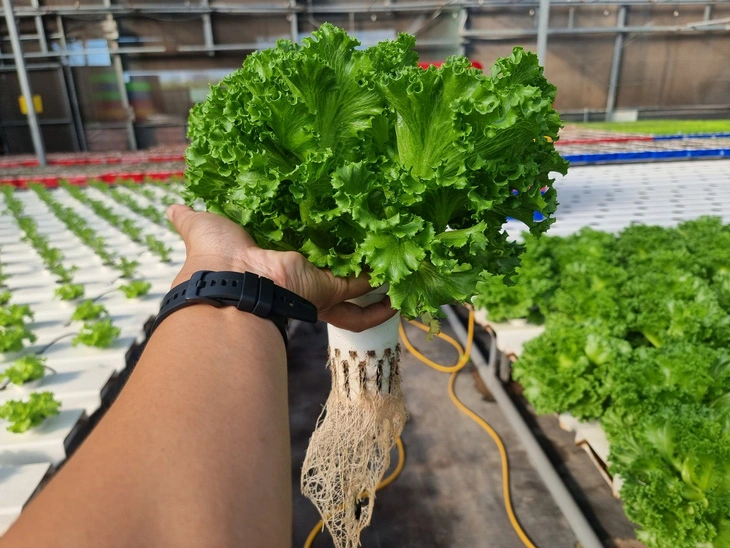Tuan was impressed by his experience working on land appraisal for the bank, which made him realize the challenges that farmers often face due to unfavorable weather conditions.
In addition, with the shrinking land area for farming in Ho Chi Minh City every year, there is a clear need for an agricultural model that can yield high-quality products and high yields.
These situations motivated Tuan to research farming and establish his own hydroponic vegetable farm, which can produce up to five times more than traditional growing methods.
“After leaving my stable job and income to pursue farming, I faced great pressure from my family, but my passion drove me to ignore their concerns,” Tuan shared.
Since hydroponic farming is a relatively new venture that requires significant initial investments, Tuan used his entire savings and secured additional funding from the bank. He also successfully convinced others to join his endeavors.
So far, Tuan has invested over VND12 billion (US$488,600) in his business.
In 2017, the Tuan Ngoc agricultural cooperative was established with an initial hydroponic vegetable cultivation area of just over 1,000 square meters within greenhouse facilities.
In the following two years, the cooperative expanded to include seven members and increased its rented land area from over 7,000 square meters to 10,500 square meters by 2022, operating at five locations, four in Ho Chi Minh City and one in south-central Ninh Thuan Province.
Tuan’s cooperative is considered the largest hydroponic vegetable greenhouse farm model in Ho Chi Minh City, according to Dinh Minh Hiep, director of the Ho Chi Minh City Department of Agriculture and Rural Development.
To reduce costs, Tuan has mastered the production of his own vegetable nutrients.
Despite facing numerous challenges, Tuan Ngoc Cooperative has started to see positive outcomes, providing employment for dozens of workers.
|
|
| Lettuce grown at Lam Ngoc Tuan’s hydroponic farm in Ho Chi Minh City. Photo: T.N. / Tuoi Tre |
“We grow 11 different types of vegetables, including lettuce, cruciferous vegetables, amaranth, and more,” Tuan said.
“Our daily output varies depending on the time of year, ranging from 600 kilograms to a metric ton, resulting in a revenue of approximately VND20-25 million [$814-1,017],” he revealed.
“Currently, we distribute vegetables to four convenience store chains, supermarkets, and hundreds of regular customers within Ho Chi Minh City.”
Furthermore, the cooperative has successfully introduced hydroponic crystal lettuce farming technology to regions with warmer climates, such as Ninh Thuan Province, even though the vegetable is traditionally grown in cooler conditions.
The cooperative has received the ‘High-Quality Vietnamese Goods’ award and was recognized as one of the 63 exemplary cooperatives of 2023 by the Vietnam Farmers’ Union.
Tuan admitted that despite being in business for six years, the cooperative has only recently begun breaking even, mainly due to high initial investments and stable selling prices.
However, with the establishment of a distribution channel and a reputation in the market, hopes are high for the cooperative’s future success.
While acknowledging that this is just the beginning of their success, Tuan is determined to persevere, knowing that there will be many challenges ahead. He estimates that it will take around seven to eight years to establish a strong brand.
“Only by being steadfast can we go a long way and achieve success in the field of urban agriculture,” Tuan said.
When discussing his future plans, he intends to expand the cultivation area and diversify the product range to better meet the needs of customers.
Tuan is calling on the city to implement more favorable policies, including low-interest loans, allowing construction on agricultural land, and facilitating channels for product distribution, to encourage and support the growth of high-tech urban agriculture.
In response, Hiep from the city’s agriculture department stated that these policies are already under consideration.





